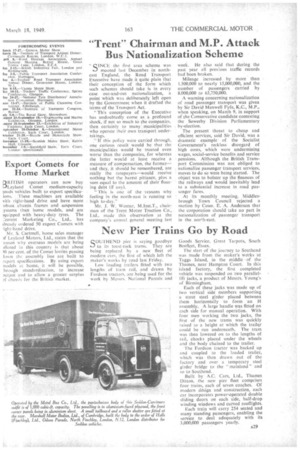"Trent' Chairman and M.P. Attack Bus Nationalization Scheme
Page 5

If you've noticed an error in this article please click here to report it so we can fix it.
Q1NCE the first area scheme was mooted last December in northeast England, the Road Transport Executive have made it quite plain that their conception of the form which such schemes should take is in every case out-and-out nationalization, a point which was deliberately left open by the Government when it drafted the terms .of the Transport Act.
." Ths conception of the Executive has uadoubtedly come as a profound shock, if not so much to the companies, then certainly to many', municipalities who operate their own tranSport undertakings.
"If this policy were carried through, one curious result would be that the municipalities would be treated even worse than the companies, for whereas the latter would at least receive a measure of compensation, the former— and they, it should he remembered, are really the ratepayers—would receive nothing but the barest pittance, plus a sum equal to the amount of their floating debt (if any). "This is of the 'reasons why feeling in the north-east is running so high to-day." Mr. J. W. Womar, M.Inst.T., chairman of the Trent Motor Traction Co., Ltd., made this observation at the company's annual general meeting last week. He also said that during the past year all previous traffic records had been broken.
Mileage increaSed by more than 1,500,000 to nearly 15,000,000, and the number of passengers carried by 8,000,000 to 63,750,000. A warning concerning nationalization of road passenger transport was given by Sir David Maxwell Fyfe, K.C., M.P., when speaking, on March 9, in support of the Conservative candidate contesting the Sowerby Division Parliamentary by-election. The present threat to cheap and efficient services, said Sir David, was a dramatic example of the Socialist Government's reckless disregard of high costs, which were undermining wages, social-service benefits and service pensions. Although the British Transport Commission was not obliged to nationalize passenger transport services, moves to do so were being started. The object was to bolster up the finances of the railways and would inevitably lead to a substantial increase in road passenger fares. At its monthly meeting, Middlesbrough Town Council rejected a motion by Coun. E. A. Anderson that the corporation should take no part in nationalization of passenger transport in the north-east.


























